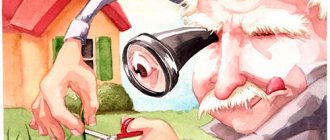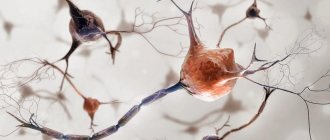Do you think a person has complete control over the course of his life? Most people answer this question in the affirmative, citing their life plans, aspirations and goals as evidence. However, in the case of various life difficulties, it is difficult for a person to admit his failures. An example is the following question: “in order to occupy a certain social status, is it necessary to work hard or wait for favorable circumstances?” Or: “during a family quarrel, who initiates the conflict - your environment or you?” Conventionally, people are divided into two types: the first, in the case of failures, look for their cause in the external influence of various factors, the second, prefer to take responsibility for their destiny upon themselves. In order to give the correct answer to the questions above, you should carefully familiarize yourself with the phenomenon of locus of control.
Locus of control is a generalized subjective expectation of the extent to which a person is able to control the events that happen to him
What is locus of control
Locus of control in psychology is a phenomenon that divides all representatives of humanity into two conditional groups. Representatives of the first group blame various external factors for their troubles. Think about how often you hear from people about inadequate management, negative circumstances, bad luck and other negative influences from the external environment. People belonging to the second category are firmly convinced that external stimuli do not have a significant impact on their lives. In various difficulties, they prefer to blame only themselves. It is important to note that such people do not take into account that their difficulties may be caused by the selfish, greedy and other negative actions of the people around them.
As mentioned earlier, representatives of the first group are firmly convinced that their life goals are of little importance. In their opinion, everything is determined by fate, so you shouldn’t “jump out of your pants” and try to achieve the impossible. Representatives of the second category of people believe that perseverance and effort will allow them to achieve their goals no matter what. This division is called the phenomenon of locus of control.
How to develop an internal locus of control
The ideal option for each individual would be the uniform development of both internal and external loci. From here comes the desire to change, to become better. Changing the locus of control can only occur under the supervision of a psychotherapist who will develop programs specifically designed to increase self-esteem.
To achieve internal balance without the help of psychotherapists, you must:
- control and not transfer your responsibility to others
- be responsible for your actions and understand the degree of responsibility
- admit your failures, guilt and independently assign yourself punishment
If the internal locus predominates, then intentions should be changed:
- There is no need to take everything at once, you should give in return. For example, mutually beneficial deals.
- Be observant. In the actions and reactions of others, you can find equivalent solutions to actions. There must be a connection between a person's action and his reaction to it.
- Be correct in your behavior and communication.
If you are led (perhaps by your work team or friends), change yourself:
- Be confident in yourself, in your actions, words and actions.
- Be unresponsive to the group's opinions
- Show your opinion
- Listen carefully to other people's opinions
- Keep yourself in check
- As little negativity towards others as possible.
- Your own point of view about the information received.
Remember, that:
- A harmonious existence should be achievable and quite close to the current state.
- A person must set realistic goals in the process of moving towards the main goal.
- Daily work will help achieve harmony.
- Education and self-education are a mutual process, often endless.
Theory
For the first time, this phenomenon was consecrated in his scientific works by a psychotherapist from America, Dr. J. Rotter. This scientist in his works says that human behavior is based on two polar aspects. One of them is chosen as the main one, after which the individual begins to adhere to the given attitude. Locus of control is divided into two types:
- External type - which is the external pole. This model of behavior involves shifting the blame for various life difficulties to a fateful combination of circumstances.
- Internal type – which is the internal pole. This behavioral model is characterized as complete control over all actions that can determine the course of life.
It is important to note that locus of control has an important impact on the course of human life.
People belonging to different groups differ in their choice of life position and the productivity of their work. The Rotter locus of control test, developed by the author of this phenomenon, allows you to determine membership in a specific group. Let's take a look at each of them in more detail.
People with an external locus of control are convinced that the events that happen to them depend on their own activity
Locus of Control Test
The purpose of the technique is to determine the characteristic orientation of the individual towards external (external) or internal (internal) stimuli. Instructions – the test contains 44 short statements. It is necessary to imagine the situations described and select the answer: “+” (“yes”), “–” (“no”).
Who is to blame for successes and failures in life?
We need negative or positive answers to the following statements:
- Career growth is a gift of fate, not human effort.
- Divorces occur between people who are not ready to make concessions to each other.
- Getting sick is a matter of chance; if you are destined to get sick, there is no escape.
- The reason for loneliness is a lack of interest and friendliness towards others.
- The fulfillment of desires depends on luck.
- There is no point in trying to gain the sympathy of others.
- Welfare affects family happiness no less than the relationship between spouses.
- I have little influence on what is happening.
- The effectiveness of leadership lies in controlling the actions of subordinates, rather than relying on independence.
- Grades at school depend on the mood of the teacher, and not on your own efforts.
- I believe in realizing my own plans.
- Luck is the result of long efforts.
- A healthy lifestyle helps your health more than pills and doctors.
- If people are not compatible, their efforts to create a life together will be in vain.
- My good deeds are highly appreciated by others.
- Children's behavior is the result of parental education.
- Chance or fate has no significant meaning in life.
- I don’t think ahead, because much in life depends not on me, but on circumstances.
- My performance at school depended on my own efforts and readiness.
- I feel guilty in family quarrels.
- People's lives are determined by a combination of circumstances.
- I prefer guidance that allows me to figure things out on my own.
- Lifestyle does not affect possible illnesses.
- An unfortunate combination of circumstances interferes with success.
- Employees are responsible for poor company management.
- I cannot change the existing relationships in the family.
- If desired, I will win over any person.
- The younger generation is influenced by various circumstances; the efforts of relatives in education are useless.
- I myself am to blame for what is happening.
- Sometimes it is difficult to characterize management decisions in a given situation.
- A person who has not achieved success at work has not shown enough effort.
- I get what I want from my family.
- Other people are to blame for my failures.
- A child can be protected from a cold if you take care of prevention.
- With the onset of a “dark streak”, I wait until the problems are resolved in their own way, without trying to change anything.
- Success is the result of hard work and depends little on fate.
- The happiness of my family depends on me.
- I don't understand why some people like me and others don't.
- I make decisions and act independently, without relying on chance or the help of strangers.
- The merits of people often remain unrecognized, despite their diligence.
- Sometimes it is impossible to find a way out of a family situation even with a strong desire.
- Talented people who have not realized their own abilities have only themselves to blame.
- Many successes are achieved with the help of outsiders.
- Most failures are caused by laziness, a small number depend on luck.
Testing the organization's employees for locus of control
To determine your own locus of control, you need to count the number of answers on a separate scale, each match is equal to one point on it. For example, 4 positive and 6 negative answers matched, the total amount was 10 points.
General internality scale:
- «+» 2, 4, 11, 12, 13, 15, 16, 17, 19, 20, 22, 25, 27, 29, 32, 34, 36, 37, 39, 42, 44;
- «–» 1, 3, 5, 6, 7, 8, 9, 10, 14, 18, 21, 23, 24, 26, 28, 31, 33, 38, 40, 41, 43.
Processing the results:
- 0-11 points – externality;
- 12-32 points – mixed type (depending on the circumstances, the person behaves like an internal or external type);
- 33-44 points – internal.
About the algorithm for calculating the number of points based on these answers, detailed information can be found on the Internet. In psychology, locus is not a diagnosis, but a relatively stable value that can change throughout life under the influence of various factors: economic, legal, social. If a person grew up in a loving family, his parents instilled the habit of taking responsibility for himself, there is a high probability of developing an internal locus of control. Pupils of pupils with authoritarian, strict, unpredictable parents are external. People are capable of acquiring an internal locus or, conversely, freeing themselves from unhealthy self-control independently throughout their lives.
External group
People belonging to this group are firmly convinced that their efforts and efforts will not be able to change their usual way of life. In their opinion, forecasting and planning will not be successful, so they can be postponed to the near future.
Individuals included in the external group expect various gifts from life that can change their lives. Most of these individuals are characterized by such qualities as low self-esteem, unreasonable fear and anxiety. Reluctance to take responsibility is accompanied by an inability to defend one’s own interests. Experts note that this category of people is characterized by impulsiveness, causeless aggression and a tendency towards depressive disorder. They often give in to excitement and take risky actions without thinking about the possible consequences.
External locus of control is the desire for conformity. This fact is based on experiments and research conducted on the topic of the phenomenon in question. The basis of such studies is the Rotter test. Based on membership in one of the categories, experts formed a focus group. This group included people with overestimated indicators of belonging to the locus of control of both types.
The purpose of this experiment is to identify individuals who are able to resist public opinion and people who agree with it. Each test participant was given a certain financial amount, which was to be used as a bet on personal opinion or the opinions of others. As a result of the experiment, participants belonging to the internal group made bets taking into account their own opinions, despite the presence of confrontation with others. Individuals belonging to the external locus relied on public opinion, without doubting its truthfulness and correctness.
Internal type
Internal locus of control implies responsibility for decisions made and actions taken. According to experts, taking responsibility increases the power of incentives and the desire to achieve your goals. Based on this, we can say that internal locus of control is closely related to emotional stability. A person who adheres to this behavior is ready to “sacrifice” personal comfort in order to achieve the goal. The life motto of such people is that only work can help achieve success.
This type of locus of control allows an individual to defend his own worldview and interests in various situations, from family relationships to politics. In order to become more familiar with this pole, let's look at another scientific study.
Students from an American college took part in this experiment. The focus group included activists from various groups that fight for the rights of the population. The result of this experiment was quite predictable, since most of the subjects belonged to the internal group. The focus group was provided with information about how cigarettes negatively affect the internal organs and systems of the human body. The internals, having become familiar with this information, made attempts to get rid of their addiction.
Externals did not take any action, counting on magic pills that could solve all the problems that arose. None of the focus group members with this behavior pattern took a single decisive step to resist fate.
People with an internal locus of control believe that they are the ones who create reinforcements for themselves through their behavior and control everything that happens to them.
Types of people
Locus of control, according to testing, determines the dominant type of responsibility. In psychology, it is common to distinguish 3 types of people:
- external;
- internal;
- mixed.
In psychology, it is believed that pure, 100% types of external and internal locus of control do not exist - in each a certain part of the properties can dominate, or exist in a balanced way.
Internals are characterized by high responsibility for what is happening in their lives; they are confident that they control events, have independent thinking and never fall under the influence of others. Internals are characterized by high willpower, they are emotionally stable, quickly restore and maintain internal harmony. This set of qualities helps them to be purposeful.
External people tend to be passive, go with the flow, and depend on the opinions of others. Because their locus of control is external, they are more likely to be insecure, procrastinate, anxious, aggressive, and suspicious. Externals rarely see their own mistakes, and they are also characterized by low communication skills and poor planning.










